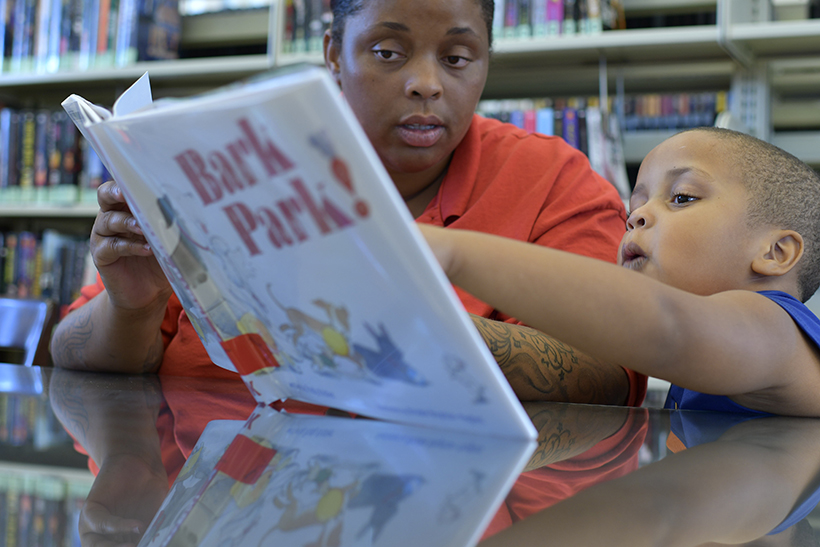This post was written by NCTE member Tiffany Flowers.
As someone who has carved out a niche within the research literature regarding African American literacy development, I write, teach, and research along these lines. I am constantly looking for examples of what this looks like in both theory and practice.
This can mean a number of things to someone who is writing about these issues. However, what it means for me is something more culturally specific and responsive. I am looking for initiatives which are rooted within Black communities that are grassroots and focus on impacting the literate lives of African American children.
Additionally, those initiatives must be ongoing and meaningful. I recommend initiatives which can inspire, inform, and transform the literate lives of Black children.
Two years ago, Marley Dias (a 12- year-old activist) dared to create a grassroots project which landed her a PBS interview, a Forbes feature, an award from Black Girls Rock, and a book deal.
After going viral, she collected over 11,000 books to distribute to schools through her online nonprofit. The focal point of her campaign was to dare to ask, “Where are all the Black girl books that look like me?” As droves of people retweeted her campaign and donated books, many did so with both joy and sadness. The truth is that even though there are some books available, we are far from where we need to be in relation to solving the problem that a 12-year-old from New Jersey dared to pose.
After Marley Dias started her nonprofit, St. Louis resident and literary activist Sidney Keys, III co-founded the Books and Bros reading club and his efforts went viral. He wanted something as simple as creating a book club for Black boys to become a cultural norm to encourage literacy and entrepreneurship for Black boys. He was featured on Now This, News One, and several other media press outlets. Although his club was successful at the time, more than a year ago, there are few newly formulated efforts in this area.
Alvin Irby founded Barbershop books to reach Black males with high-quality, high-interest books during their visits to barbershops. The nonprofit generates lists for Black males similar to the Jon Sciezca and his movement to get boys to read. Books must be nominated by boys and they must be engaging. This landed him an award as a social entrepreneur. The nonprofit organization won the Innovations in Reading Prize from the National Book Foundation. This program can be set up in any city by getting barbers to register and open up space in their shops.
Omar and Kimberly Finley in Decatur, Georgia started a Children’s Booktique which features only African American children’s books. Listening Tree Books is near a beauty salon where many of the young customers and parents visit the store to browse books. All of the books are curated and the couple hosts a Young Entrepreneurs program each summer for children in the neighborhood where the book store is located. Additionally, they host a traveling book fair for schools that want to diversify their collection by getting firsthand knowledge of every single book. Their goal is to make literacy the norm within their community. This is done by hosting free author events each month and encouraging children to join the B-Girls and B-Boys book club. There are a number of ways to take advantage of the program offered through the bookstore.
As many literacy teachers look for resources, people, strategies, and advice on what to do when they encounter K–12 African American students who struggle with either reading or aliteracy, it is important to learn about existing grassroots initiatives. This will empower teachers to either emulate these efforts or reach out to these initiatives for assistance.
 Tiffany A. Flowers is a native of Chicago, Illinois. Dr. Flowers is a children’s author, literacy advocate, and professor. Currently, she is an assistant professor of education in the department of cultural and behavioral sciences at Georgia State University Perimeter College. Dr. Flower’s research agenda is divided into four distinct and interrelated areas of research which includes, African American literacy development, children’s literature, diversity issues in education, and emergent literacy. You can contact her at tflowers@gsu.edu.
Tiffany A. Flowers is a native of Chicago, Illinois. Dr. Flowers is a children’s author, literacy advocate, and professor. Currently, she is an assistant professor of education in the department of cultural and behavioral sciences at Georgia State University Perimeter College. Dr. Flower’s research agenda is divided into four distinct and interrelated areas of research which includes, African American literacy development, children’s literature, diversity issues in education, and emergent literacy. You can contact her at tflowers@gsu.edu.

